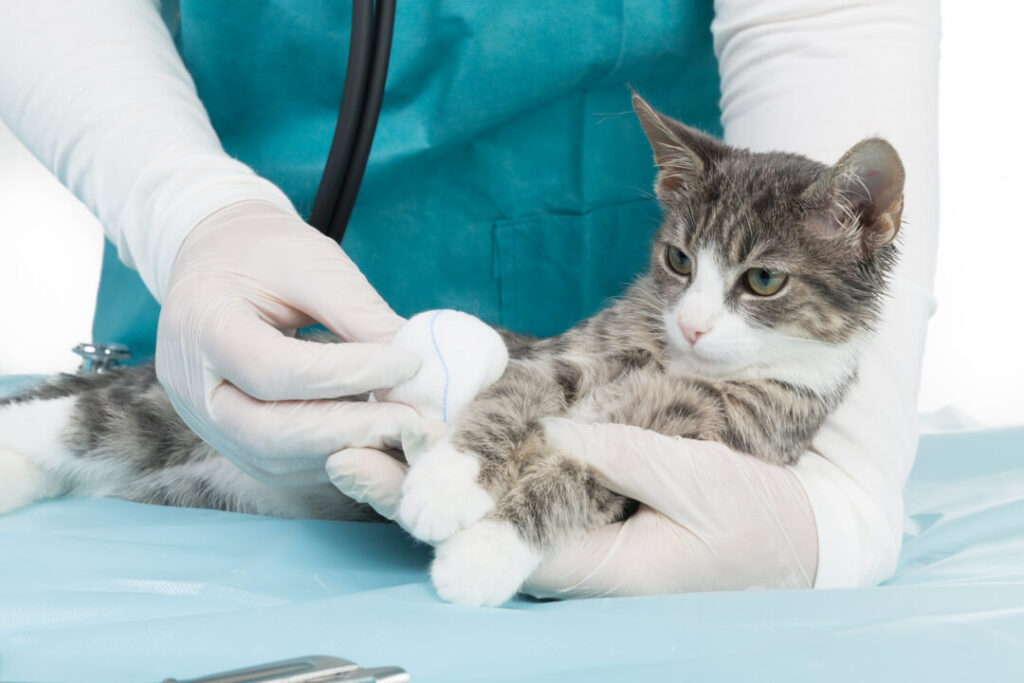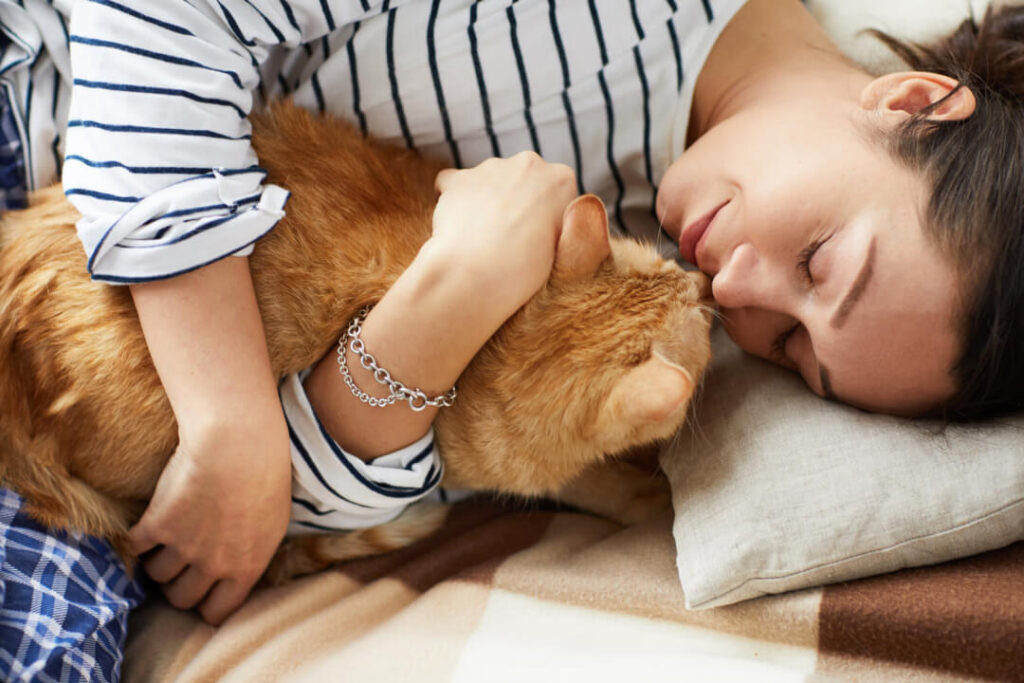How do you find the right cat insurance? Many people are daunted by this task. Cat insurance is an impenetrable jungle of details for the uninitiated.
And, as much as we love them, does it even make sense to take out extra insurance for CATS?
What types of cat insurance are there?
A cat’s life is certainly worth protecting, but do insurance companies offer that? Is there an “all-inclusive package” for our furry friends?
What types of dedicated insurance policies for cats are there?
And what exactly does cat insurance cover?
Cat health insurance
If you decide to take out cat health insurance, it will cover the costs you incur when you visit the vet – from examination and diagnosis to treatment and the necessary medication. The scope of the insurance varies depending on the insurance company, so it’s worth comparing policies carefully.
Cat operation insurance
You can also take out an insurance policy in case your poorly puss needs surgical intervention, i.e. an operation. Depending on what you sign up for, this kind of insurance will cover the expenses related to an operation – cost of examination, anesthetic and surgery itself:

Private liability insurance for cats
If you have private liability insurance, you don’t need to take out extra liability insurance for your furry friend, because your insurance will also cover damage caused by cats. From an insurance point of view, cats are considered small pets, and thus not likely to cause a lot of damage. But you should check whether certain damage is excluded or non-reimbursed. This could include damage to a rental apartment: a scratched parquet floor can be quite expensive! In this case, if you don’t have private liability insurance, get professional advice.
Is cat insurance useful?
Is cat insurance worth it or financially exorbitant? Especially when every cat, allegedly, is supposed to have up to nine lives to play with!
Whether you consider cat insurance to be a good investment depends, above all, on how you view insurance: Are you one of those people who absolutely want to insure everything including the kitchen sink? Or do you take a relaxed view about fate, no matter what happens?

The advantages of cat insurance
Vaccinate once a year: a tick in the box for your annual trip to the vet? If so, wonderful! 9 times out of 10 a visit to the vet goes just fine, but occasionally there’s a problem. What may begin as a routine examination becomes a shock. Your animal expert makes a scarydiagnosis and you swallow hard because youdon’t know how you’re going to afford it. Only then do you think: “If only I had taken out insurance!”
How much does cat insurance cost?
The price of cat insurance varies. It depends on which services are important to you and the company with which you take out a policy. Before you sign a contract, you need to consider whether you can easily pay out of your own pocket for what you want to be insured. Because then you can save on the extra cost of insurance for your cat!

What costs are reimbursed
Depending on the policy you can have the costs of treatment, operations and medication reimbursed. Check before signing the contract whether certain diseases and types of treatment are excluded or not reimbursed. What requirements does your furry friend have to meet (age, state of health etc)?
Examples of cat operation costs
Depending on the kind of operation needed, this can cost you dearly. The cheapest are dental interventions that run to around €100. For intestinal problems, operations can start at €200; in case of kidney stones or bone fractures it could be €350 or more. A cruciate ligament surgery costing 1,000 is really worth the insurance cover!
Quelle: https://www.petplan.de/, Stand 29.05.2020
• Dental intervention ≈ 100 €
• Intestinal operation ≈ 200 €
• Kidney stones and bone fractures ≈ 350 €
• Cruciate ligament surgery ≈ 1.000 €
You might even have to eat into your savings…
What to look for when comparing cat insurance policies
Before you sign an insurance policy for your cat, take the time to take a closer look at what’s offered by different providers:
- Who provides the insurance cover?
- Is it cost-effective?
- Which provider gives the most value for money?

Where can I compare cat insurances?
If you don’t want to approach an insurer right away, you can research online in advance. There are different comparison calculators: you simply enter your data and it will find you offers that suit. Make sure the rates are up-to–date – online information is not always hot off the press. If you’ve found what you’re looking for, you can then contact the insurance company directly or an independent broker to get a corresponding offer.
Quelle: https://katzenversicherung-blog.de/katzenkrankenversicherung/, Stand 03.06.2020
What should I look out for
Be on the lookout for the following points:
- Age limits
- Health and general condition
- Discounts
- Maximum rates
- Waiting times
- Restrictions
Be vigilant about how different insurance companies treat individual cases when it comes to a cat’s age, health and general condition.
Do you have to contribute to costs? If not, does it cost extra?
Is there a reduction if you insure several animals?
Are there maximum reimbursement rates? When is compensation paid and how long do you have to wait?
Are there any national or international restrictions?
Quelle: https://www.tierische-tipps.de/impressum/, Stand 29.05.2020
Insurance for my cat: points to consider that
Before you insure your cat, you should pore over the conditions carefully.
Read the small print when you are presented with an offer and draft contract, even if it’s boring. This often applies: the smaller the font, the more important the content. Are there certain points that vary from case to case that affect your cat?
The best thing to do is to make a list of everything you should check before signing, such as…

Age
With many insurers, rates are based on the age of the cat and the way it’s looked after. How old is your cat? If there’s an age limit, your furry friend will only be accepted up to a certain age.
Is she an exclusively indoor cat or does she go outdoors every day?For some companies, the cost also differs depending on the cat breed.

Fee scale
In some countries there is a statutory fee scale for those treating animals.
It sets the amount that a veterinarian can charge. However, they are allowed to ask for more. Billing at a single rate of vet fees is standard, but some insurers also reimburse if the vet charges more, i.e. two or three times the rate.

Discount for several animals
Some insurance companies argue that the risk is not reduced but increased when there is more than one animal.
Depending on the type of animal, other insurance companies offer different types of discount for certain insurance policies.
For example, if you insure several of youranimals with the same company.

Waiting time
Wait, wait, and still waiting.
If you want to insure your cat, it’s not always instantly possible with every insurance company. You sometimes have to accept a waiting period of one to three months.Why is this? Some companies prescribe these waiting periods, to avoid wise guys taking out insurance after diagnosis.

Excess
There are policies with and without excess.
If, as a cat owner, you take on part of the costs yourself – i.e. you “contribute” – this is a tariff with a deductible. This can be a certain amount or a percentage.
Other insurance companies offer tariffs with no excess.

Maximum reimbursement limits
So much and no more! If there’s a certain maximum reimbursement limit stipulated in the contract – that’s all they pay.
If you want to have 100% of total costscovered by your insurance, you‘re better to choose an insurer who can offer you this. Usually the premium will be a bit more expensive.

